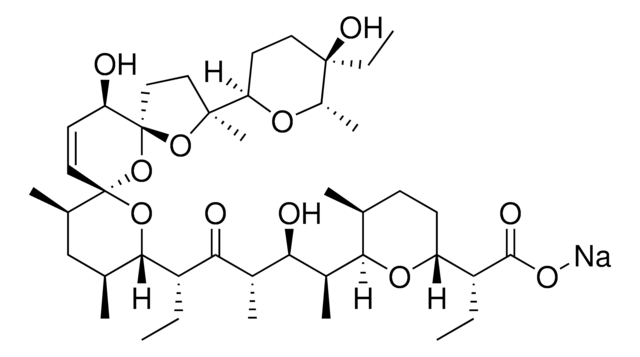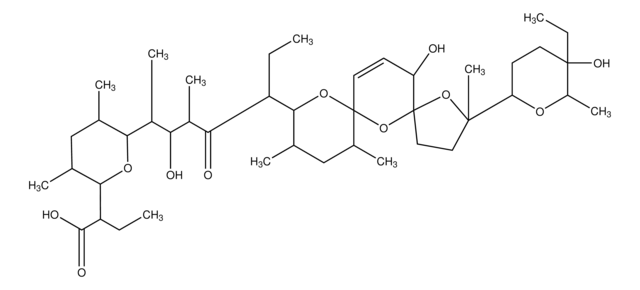S4526
Salinomycin
from Streptomyces albus, ≥98% (HPLC), powder, MDRP-1 inhibitor
About This Item
Recommended Products
product name
Salinomycin, from Streptomyces albus, ≥98% (HPLC)
biological source
Streptomyces albus
Quality Level
Assay
≥98% (HPLC)
mp
112.5-113.5 °C (lit.)
antibiotic activity spectrum
neoplastics
Mode of action
cell membrane | interferes
storage temp.
2-8°C
SMILES string
CC[C@H]([C@H]1CC[C@H](C)[C@@H](O1)[C@@H](C)[C@H](O)[C@H](C)C(=O)[C@H](CC)[C@H]2O[C@@]3(O[C@@]4(CC[C@](C)(O4)[C@H]5CC[C@](O)(CC)[C@H](C)O5)[C@H](O)C=C3)[C@H](C)C[C@@H]2C)C(O)=O
InChI
1S/C42H70O11/c1-11-29(38(46)47)31-15-14-23(4)36(50-31)27(8)34(44)26(7)35(45)30(12-2)37-24(5)22-25(6)41(51-37)19-16-32(43)42(53-41)21-20-39(10,52-42)33-17-18-40(48,13-3)28(9)49-33/h16,19,23-34,36-37,43-44,48H,11-15,17-18,20-22H2,1-10H3,(H,46,47)/t23-,24-,25+,26-,27-,28-,29+,30-,31+,32+,33+,34+,36+,37-,39-,40+,41-,42-/m0/s1
InChI key
KQXDHUJYNAXLNZ-XQSDOZFQSA-N
Looking for similar products? Visit Product Comparison Guide
General description
Application
Biochem/physiol Actions
Signal Word
Danger
Hazard Statements
Precautionary Statements
Hazard Classifications
Acute Tox. 2 Oral
Storage Class Code
6.1A - Combustible acute toxic Cat. 1 and 2 / very toxic hazardous materials
WGK
WGK 3
Flash Point(F)
Not applicable
Flash Point(C)
Not applicable
Personal Protective Equipment
Certificates of Analysis (COA)
Search for Certificates of Analysis (COA) by entering the products Lot/Batch Number. Lot and Batch Numbers can be found on a product’s label following the words ‘Lot’ or ‘Batch’.
Already Own This Product?
Find documentation for the products that you have recently purchased in the Document Library.
Customers Also Viewed
Our team of scientists has experience in all areas of research including Life Science, Material Science, Chemical Synthesis, Chromatography, Analytical and many others.
Contact Technical Service
















